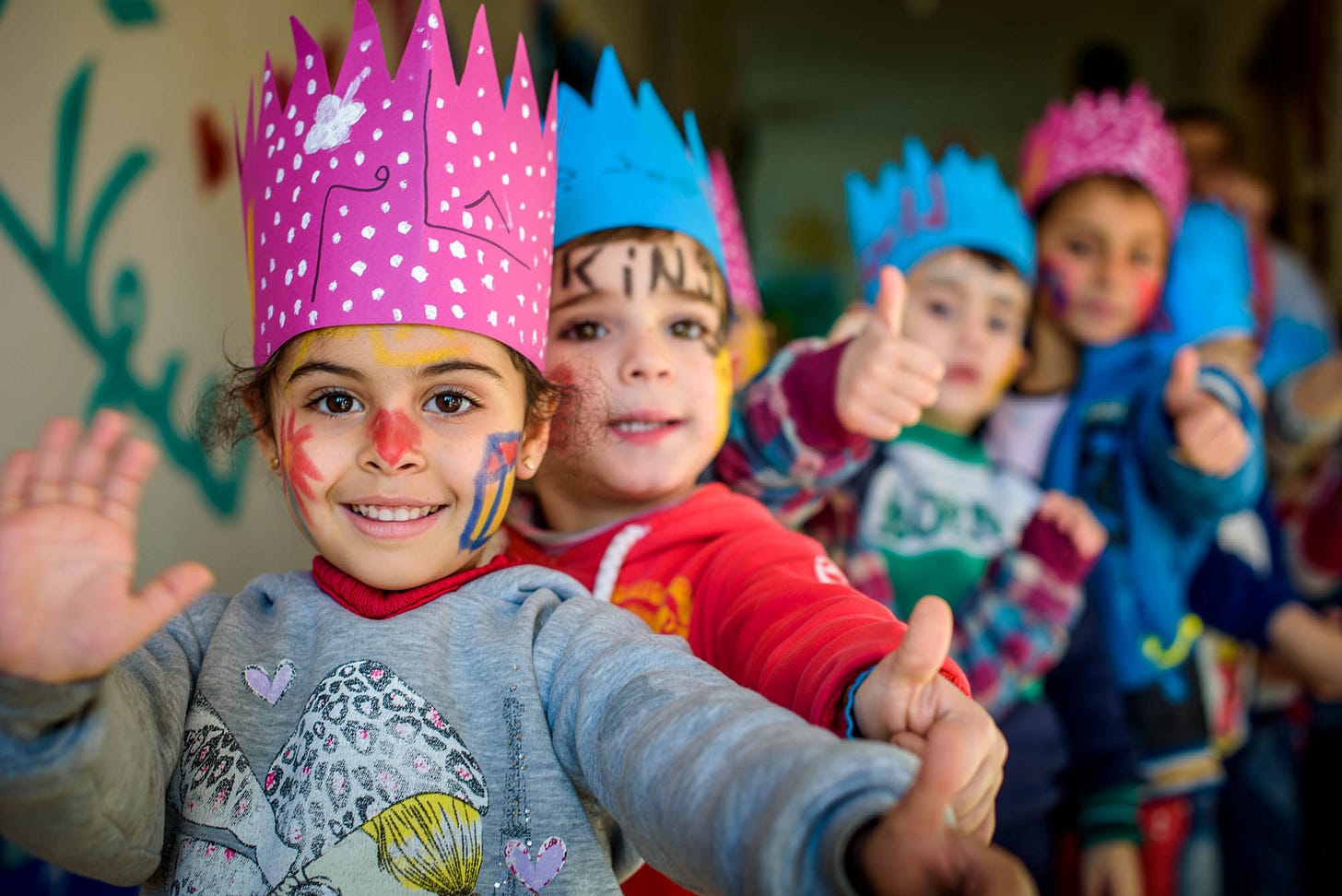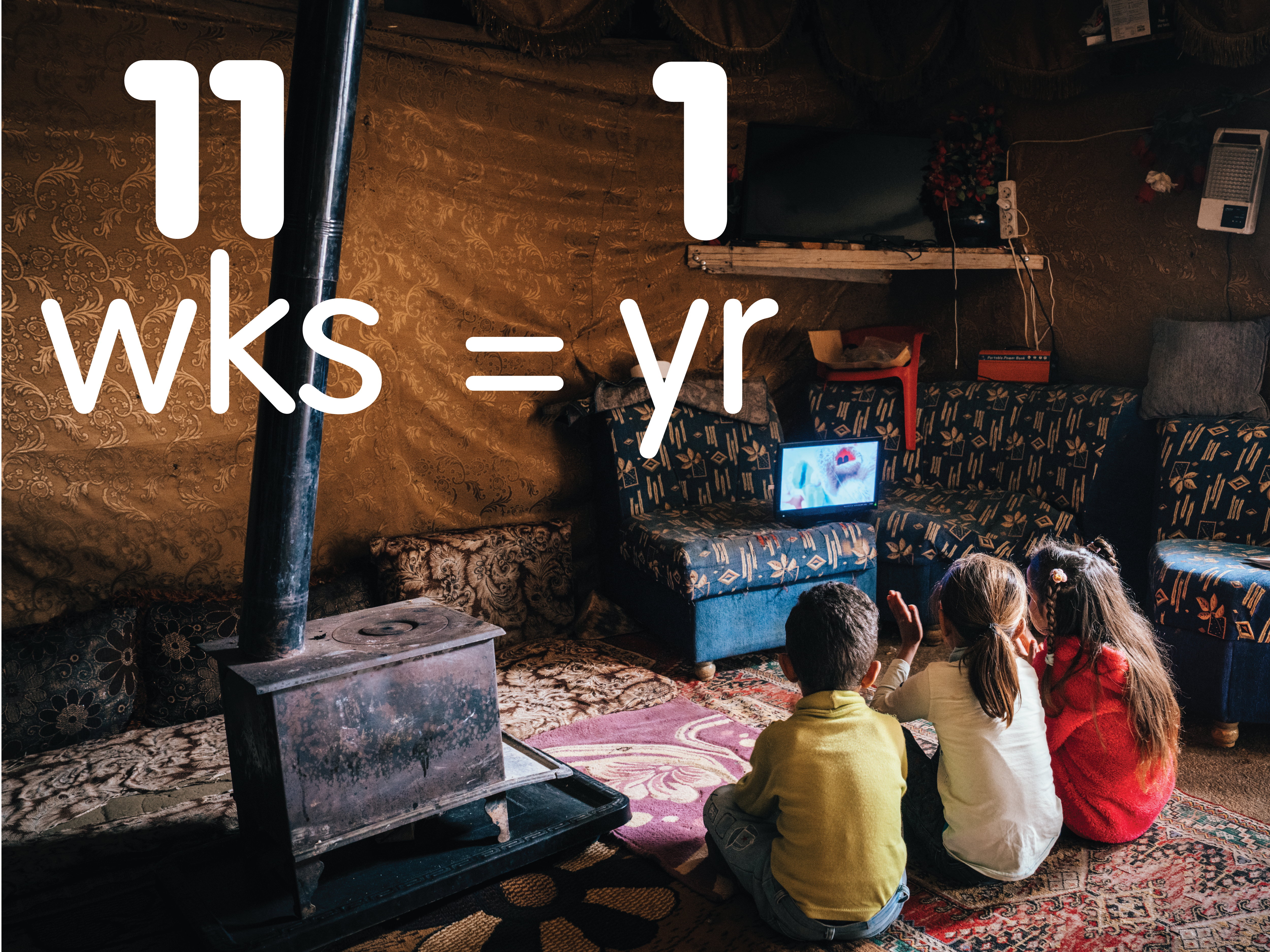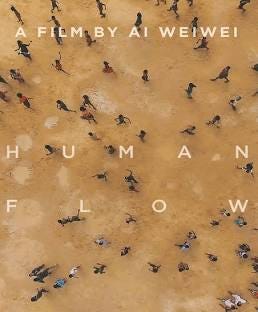Small Talks, No. 101
October 11, 2024
Small Talks is back!
After a “hiatus year” to complete my book Love to Learn: The Transformative Power of Care and Connection in Early Education (now available for preorder, and to be published in February 2025), it is my great joy restarting writing this weekly newsletter.
Thank you for all the encouragements, with special gratitude to Jay Lee, early childhood teacher and a new dad, and to Dulguun Batmunkh, whom I met when she was a student at Stanford, and is now working on global early childhood education at OneSky. Here we go…
Welcome to the 101th edition of Small Talks. Every Friday, I highlight 6 areas of weekly joys and reflections in early childhood and the whole family. Small Talks leverages my experience at the intersection of education, philanthropy, and impact investing. Enjoy!
What I’m celebrating -
This week is dedicated to refugee education, or more accurately, early education for displaced children and families.
I believe that displacement is a risk we all face. Consider the fires in California, hurricanes in Florida or North Carolina, and the conflicts in Ukraine and the Middle East. These urgent, pervasive challenges demand innovative solutions to support children and families.
Did you know?
2023 saw the highest number of refugees/forcibly displaced populations ever recorded in the history of mankind!
The number of refugees is on the rise, having doubled in the last decade.
Estimates show the number of displaced humans could increase by 10x by 2050 given climate and conflict/political disruptions. The number of environmental migrants by 2050 range from 25 million to 1 billion.
Children are heavily over-represented among the world’s refugees (1/3 of global population, 1/2 of all refugees) and nearly a quarter of children live in conflict or disaster-stricken countries globally; 16-18% of refugees are children under the age of 5.
Refugee children can be up to three times more likely to be poor than adults.
A refugee child is 5x less likely to attend school and is twice as likely to suffer from PTSD compared to non-refugee children.
Refugee girls are 2.5 times more likely to be out of school than their male peers.
It takes 20 years on average to resettle. Refugee families often spend an average of 20 years in displacement before being resettled or returning home.
Less than 2% of global humanitarian assistance goes to early childhood development in emergencies.
Some hope.
Research shows the solution: nurturing care and learning opportunities in the crucial early years can mitigate the effects of early adversity.
Sesame Workshop’s 11-week remote early learning program Ahlan Simsim in Syria (funded by $100 million award from MacArthur Foundation, which I had the privilege to judge in 2017) yielded educational results equal to a year of in-person preschool, proving that caregivers, when supported by teachers, can successfully deliver an impactful media-integrated preschool curriculum at home.
Another inspiring model is the Village Institute in Aurora, Colorado, that supports refugee women to become early childhood educators.
What I’m listening to -
An inspiring coverage of SOLA, a program focused on educating Afghan girls, led by Shabana Basij-Rasikh, forced to relocated to Rwanda.
What I’m reading -
Luma Mufleh's story captivated me back in 2019, when I first learned about how she founded Fugees Academy, a successful private school in Georgia serving refugee children often overlooked in traditional schools. Her book Learning America: One Woman’s Fight for Educational Justice for Refugee Children, which weaves together the story of Fugees Academy with her personal journey as an immigrant, entrepreneur, coach, school founder, and mother is an inspiring read.
What I’m watching -
This documentary Human Flow by Ai WeiWei reminds us that the movement of people is a testament to resilience, an ever-flowing river of hope, struggle, and survival that transcends borders and unites us in our shared humanity.
What I’m learning more deeply -
Cash transfers to refugee families seem to be helping with children school attendance and academic performance.
Two quotes I’m pondering -
From two actresses:
"As you grow older, you will discover that you have two hands: one for helping yourself, the other for helping others. Education helps us extend both hands to those who need it most." — Audrey Hepburn
"Education is the key to the future: You've heard it a million times, and it's no less true for refugee children." — Angelina Jolie
Feedback is a gift. Which part above is your favorite? What did I miss? What do you want more or less of? Other recommendations? Please kindly let me know. Thank to all of you who are sending me amazing suggestions.
If you enjoy this newsletter, please help spread the word by sharing with your friends, colleagues, and networks.
Have a wonderful week. Please stay safe and care for each other.
Isabelle





Wow, what a surprise to see this back in my inbox and you came back with a bang! Thank you for writing about refugees... I used to work with Lutheran Social Services in Michigan and worked with unaccompanied minors there. It's such important work and I love that you are using your platform to bring awareness. I'd like to share with you about the work iACT is doing with refugees in early childhood education. They have a program called Little Ripples - A community-led preschool program that nurtures the cognitive, social, and emotional development of children affected by war and conflict. Learn more here: https://www.iact.ngo/items/center-for-educations-innovations%3A-little-ripples. Welcome back... this made my day :)
Wonderful surprise to have my weekly dose of learning, joy and reflection back! Thanks for all you do Isabelle!